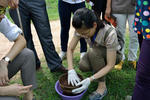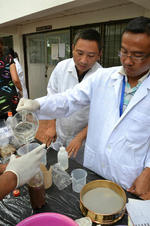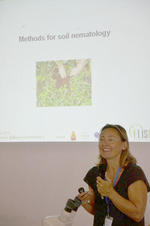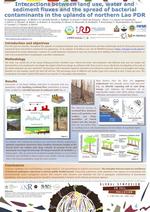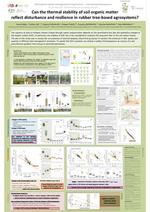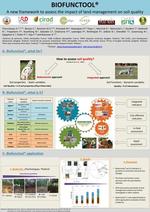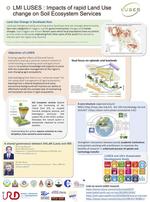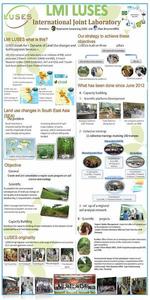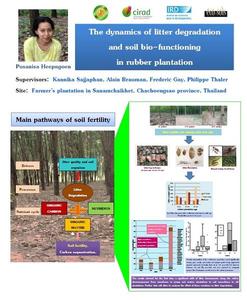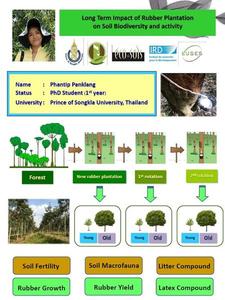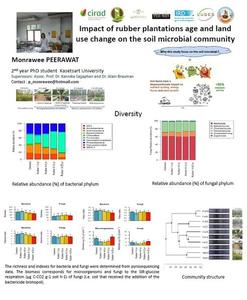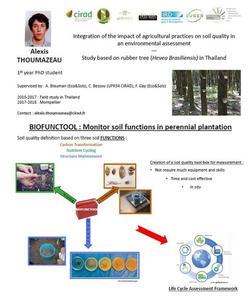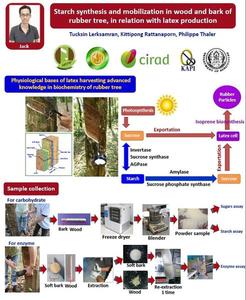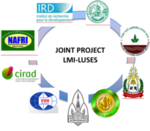Training on soil nematodes : 1st step for the LMI LUSES to structure a network
A weekly training course was organized under the framework of the LMI LUSES and as been co-funded by the LMI RICE and PPR SELTAR and Khon Kaen University. the aim of this training course involving a dozen of scientists and students from South-East Asia was to study a very specific soil organisms: the nematodes.
Nematodes are microscopic worms present in every soil type. Living in the water film, which surrounds the soil particles, they are particularly sensitive to every change of the “soil” environment. Therefore, the study of the nematode community composition is a good way to monitor soil quality: they constitute an precious bio-indicators of soil “health”.
Gathered from all around the South-East Asia, the trainees have shared their enthusiasm to receive this learning support during the welcome party.
“These trainings are the first step to structure a network”, explained Alain Brauman, coordinator of the LMI LUSES. “The next step must be to identify and to train individually those who will become network coordinators from this pool. These personalities should develop research projects to a medium term perspective, and take support from the network”.
The training on soil nematodes, provided by a French trainer (Dr C. VILLENAVE: former IRD, ELISOL) and a Thai partner (Dr. Prakaijan NIMKINGRAT: Faculty of Entomology, Khon Kaen University), was a success. On the one hand, it alternated theoretical approach, field works (soils sampling) and laboratory experiments (extraction and microscopic analysis of nematodes). On the other hand, this success was depending on the great organization set by Khon Kaen University, which had welcomed the trainees in its classrooms and its laboratories, and had provided scientific equipment and experienced human resources.
Other trainings are scheduled in the framework of the LMI LUSES, the next one will be on October about the scientific articles writing technics for international journals, in the field of soil sciences.
Article written by Amélie Piroux and Alain Brauman
Photo credit: ©IRD/A. Piroux
LMI LUSES Posters
Presentation of the ECOFILTER Team at the Global Symposium on Soil Pollution (GSOP18), FAO, Rome, 2-4 May 2018
Poster of the BIODIV TREE team presented at the SOM management conference held in Braunsweig on the 30 and 31 of May
Poster of the BIODIV TREE team presented at the SOM management conference held in Braunsweig on the 30 and 31 of May
Synopsis of LUSES 2017-2019
- LDD-IRD a long history of scientific cooperation
- Impact of Rubber Tree Plantation on Soil Biological Diversity
- LDD-LMI LUSES Platform of Microbiology
- LMI LUSES presentation
- PCR LDD-LMI LUSES Platform
- Laboratory guide: hygiene and safety in English
- Laboratory guide: hygiene and safety in Thai
PhDs students' scientific posters
The dynamics of litter degradation and Soil-bio functioning in Rubber plantation : Pusanisa Heepngoen
Long term impact of Rubber Plantation on Soil biodiversity and Activity: Phantip Panklang
Impact of Rubber Plantation age and Land use change on the soil microbial community : Monrawee
Integration of the impact of agricultural practices on soil quality in an environmental assessment : Alexis
Starch Synthesis and Mobilization in wood and bark of rubber tree, in relation with Latex production : Tuksin




